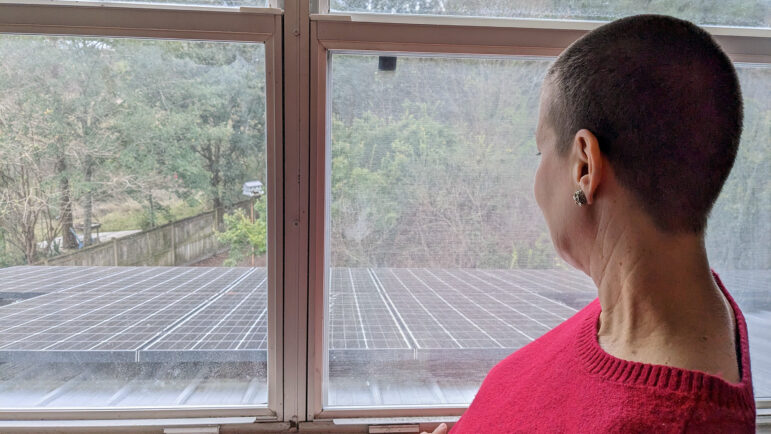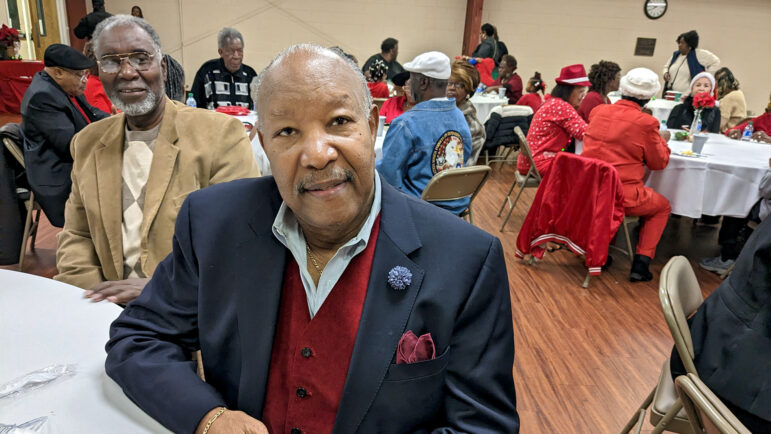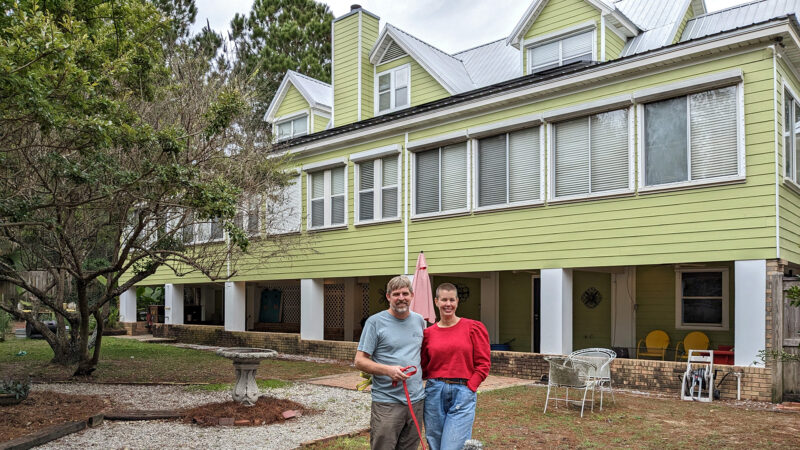Mississippi updated its solar energy guidelines. Renewable energy advocates want more
Matt Campbell and his wife Lea Campbell stand outside their home in Ocean Springs, Mississippi on December 17, 2022. They’re standing on the side of their house that has solar panels, which they installed after Mississippi introduced its net metering rules in 2015.
Nearly seven years ago, Lea Campbell and her husband Matt decided to install solar panels on their home in Ocean Springs, Mississippi to help cut down on their power bill. The panels would create energy that the Campbells would then sell back to Mississippi Power, their energy provider.
“In the size home that we have, our power bills were really high. We wanted to see if that would be a way that we could reduce our energy bill,” Campbell said.
The Campbells switched to solar in 2016 because the Mississippi Public Service Commission created the state’s first set of net metering rules. The guidelines were put in place for people who want to use renewable energy while staying plugged into the power grid of the bigger public utilities. Initially, the rules set the rate that homeowners can get for producing their own power at the utility’s current avoided energy cost rate — presented in cents per kilowatt hour— plus an additional 2.5 cents per kilowatt hour for three years. The first 1,000 qualifying low-income customers could receive an additional 2 cents per kilowatt hour.
In the beginning, Lea Campbell said she saw what was once a $300 or $400 bill get down to as low as $120 to $140 a month.
The savings sound great — like a selling point that would encourage others in Mississippi to invest in solar panels, also. But fast forward to today, and less than a thousand homes use renewable energy in the state.
Compared to the rest of the country, Mississippi was slow to adopt net metering rules that make it easier for homeowners to invest in renewable energy. For starters, it isn’t a true statewide policy. It only applies to Entergy Mississippi and Mississippi Power customers, which are considered public utilities and therefore are under the authority of the Mississippi Public Service Commission. They can limit participation to 3% of its maximum demand. Other types of energy providers, such as electric cooperatives or government entities like the Tennessee Valley Authority, set their own net metering rules.
The reimbursement rate is another reason why adoption has been slow to attract. Companies like Mississippi Power and Entergy Mississippi want to make sure they’re not losing money. But consumers want a higher rate to make the upfront costs easier to justify. Installing solar can get expensive, usually costing several thousand dollars.
“We’re fortunate in that we were able to afford being able to finance it, install it. But a lot of Mississippians just can’t,” Campbell says.

In 2022, the Mississippi Public Service Commission revised the net metering rules and added some new incentives to encourage low- and moderate-income residents to invest. The rates of reimbursement, however, remained the same.
Commissioner Brent Bailey said the new model for net metering in Mississippi was based on how they saw others in the Gulf States carrying out their guidelines.
“We hope that those lessons learned from other jurisdictions and states can be applied here,” Bailey said. “And that’s something we intend to do.”
Some states, like Arkansas, offer net metering customers the full electricity retail price. That means an hour of solar energy created and sent back to the grid offsets an hour of energy a customer consumed from the grid. But Bailey said that’s only one end of a wide spectrum in the region.
On the other end sits Alabama, which does not have net metering policies, meaning utilities get to determine their own rules. Some, Bailey said, view this policy as creating disincentives for self-investment in “distributed generation resources.”
In fact, the Alabama Public Service Commission not only allowed a power company to tax homeowners for using solar panels, but they approved an increased monthly charge. Alabama Power charges solar users $5.41 per kilowatt hour monthly through its Capacity Reservation Charge.
A group of Alabama Power customers argued solar fees discourage citizens from investing in solar, filing a lawsuit in 2021 with environmental groups such as the Southern Environmental Law Center, Ragsdale LLC and Greater-Birmingham Alliance to Stop Pollution.
Bailey said Mississippi also didn’t want to go down the route Louisiana took. At one point, Louisiana had generous incentives for its net metering customers, but those were gutted in 2019. Bailey said it had a roller-coaster impact on businesses, homeowners and the solar economy in Louisiana.
“While we may not have the most or the most aggressive set of rules as some would like to have seen, we certainly have a set of rules that I think will help support the industry as it grows,” Bailey said.
Some politicians in Mississippi — like Gov. Tate Reeves — don’t support net metering at all. He argues that it’s a bad deal for residents and would shift costs to people who aren’t using renewable energy.
— Governor Tate Reeves (@tatereeves) October 3, 2022
Some of the new rules target low-to-moderate income Mississippians — who spend more of their income on their power bills than residents of any other state — offering those customers a slightly higher reimbursement rate and a one-time rebate of $3,000. But these extra incentives don’t do enough to reach the people it claims to help, according to Glenn Cobb, a community advocate in Gulfport, Mississippi. Cobb said being able to take off $3,000 of what could be a $20,000 project is math that doesn’t work for many of the people living in his area — mostly older, working-class people on a fixed income, or low income.
“They’re right at the point where they don’t have a whole lot of money to pay on extras,” Cobb said. “And if you’re interested in getting solar energy to bring down their cost of energy, it’s almost impossible to do on the kind of income that they have.”

Cobb sees renewable energy as an opportunity to help lower energy bills for everyone. Where he lives, Mississippi Power has a monopoly, meaning customers don’t have other energy choices. And when the Public Service Commission introduced its first set of net metering rules, which had more generous incentives such as a higher participation gap and a slightly higher rebate, both Mississippi Power and Entergy challenged those rules, leading the commission to change them.
Cobb believes the solution is for communities to create their own solar programs.
“There has to be some kind of program that’s being bought in by cities and counties and local areas to have a solar area,” Cobb said. “Whether it be a solar field, whether it be a solar plant, something that could bring down the costs that we are paying for energy right now.”
One group, the Steps Coalition, is working alongside partners like the Sierra Club and the Gulf Coast Community Foundation to develop a community solar farm in the Mississippi Gulf Coast area.
They’ve set aside $3 million to build a 1.5- to 2-megawatt solar farm, which could potentially provide low-cost electricity to up to 500 low-income homes, said Jonathan Green, the executive director of the coalition. But the current rules make it expensive to get the project off the ground, in part because it costs a lot of money to connect to the public power grid.
“At the end of the day, we’ve got to have some successful models in the state,” Green said. “And I think that once we can start up some successful models, then we’ll start to see momentum.”
Part of building that momentum is creating a collective of organizations committed to supporting renewable energy in Mississippi. During hearings for the new net metering rules, pro-solar groups and advocates came out to show their support for better rules.
Those groups plan to keep pushing residents to stay engaged, especially low-income Mississippians.
This story was produced by the Gulf States Newsroom, a collaboration between Mississippi Public Broadcasting, WBHM in Alabama, WWNO and WRKF in Louisiana and NPR.
In Berlin, there are movies, there’s politics and there’s talk about it all
Buzz around whether the city's film festival would take a stance on the war in Gaza has dominated conversation in recent days.
Alex Ferreira wins 10th gold medal for Team USA, matching America’s highest total in Winter Olympics
Freeskier Alex Ferreira clinches a tenth gold medal for the U.S. in these Games, tying the U.S.'s all-time record for gold medals in a Winter Olympics.
Trump calls SCOTUS tariffs decision ‘deeply disappointing’ and lays out path forward
President Trump claimed the justices opposing his position were acting because of partisanship, though three of those ruling against his tariffs were appointed by Republican presidents.
The U.S. men’s hockey team to face Slovakia for a spot in an Olympic gold medal match
After an overtime nailbiter in the quarterfinals, the Americans return to the ice Friday in Milan to face the upstart Slovakia for a chance to play Canada in Sunday's Olympic gold medal game.
NASA eyes March 6 to launch 4 astronauts to the moon on Artemis II mission
The four astronauts heading to the moon for the lunar fly-by are the first humans to venture there since 1972. The ten-day mission will travel more than 600,000 miles.
Skis? Check. Poles? Check. Knitting needles? Naturally
A number of Olympic athletes have turned to knitting during the heat of the Games, including Ben Ogden, who this week became the most decorated American male Olympic cross-country skier.








